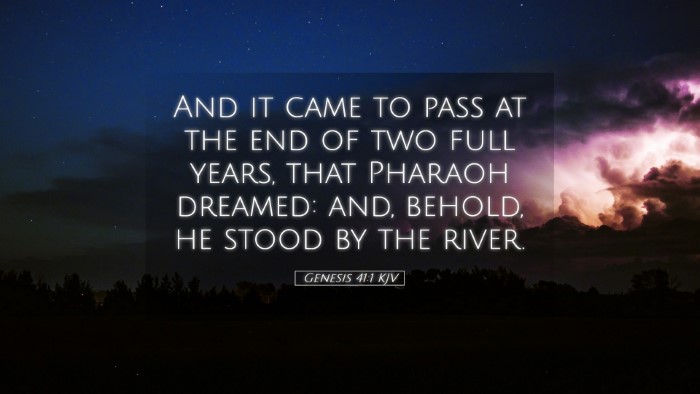Genesis 41:1 Commentary
Verse Text: "And it came to pass at the end of two full years, that Pharaoh dreamed: and, behold, he stood by the river."
Contextual Background
The narrative of Genesis 41 follows Joseph’s time in prison after being wrongfully accused by Potiphar’s wife. This period of incarceration spanned two years, during which time Joseph remained faithful to God. The transition from imprisonment to prominence begins with Pharaoh's troubling dreams, serving as a divine catalyst for Joseph’s eventual rise.
Insights from Public Domain Commentaries
Matthew Henry's Commentary
Matthew Henry emphasizes the providence of God in arranging the events of Joseph's life. He notes that the two full years in prison were necessary for Joseph's spiritual preparation and for God's timing in bringing him to Pharaoh’s attention. Henry points out that the dreams Pharaoh experienced would be pivotal not only for Joseph but also for the entirety of Egypt, illustrating God's sovereign plan to save nations through a chosen servant.
Key Takeaways from Henry:
- Divine Timing: God's timing is paramount; Joseph's emergence from prison was methodically planned.
- Preparation for Leadership: The injustices Joseph faced shaped his character and leadership abilities.
- God's Sovereignty: Even in distress, God's hand is in the background, working all things together for good.
Albert Barnes' Notes
Albert Barnes provides a detailed look into the phrase "the end of two full years," interpreting it as a significant period of completion. The chapter opens with a dream, which serves as a divine communication channel. Barnes underscores the importance of dreams in the biblical narrative, showing how they often indicate God's will and plan for the future. He highlights that Pharaoh's dream not only initiates Joseph's revival but also indicates the forthcoming trials and blessings in Egypt, highlighting God's ability to speak through dreams to leaders.
Key Insights from Barnes:
- Role of Dreams: Dreams serve as a medium for divine revelation to both the humble and the mighty.
- Impending Change: This dream symbolizes a transformation not only in Joseph’s life but also in the socio-economic structure of Egypt.
- God's Communication: God's presence in worldly power contexts indicates His ultimate authority over all earthly rulership.
Adam Clarke's Commentary
Adam Clarke elaborates on the significance of the river mentioned in the verse, suggesting it represents life and fertility. Clarke argues that Pharaoh's dream symbolized the looming famine that would follow the years of plenty and emphasizes God’s foreknowledge in revealing these truths to Pharaoh. Clarke encourages readers to see the dreams as a dichotomy of future abundance contrasted with severe hardship, urging the leaders of faith to heed God’s warnings and act wisely in their administration of resources.
Essential Points from Clarke:
- Symbolism of the River: The river signifies sustenance and the cyclical nature of abundance and scarcity.
- Awakening to Reality: God used Pharaoh’s dreams to awaken him to the reality of covenantal responsibility toward his people.
- Call to Leadership: The narrative challenges leaders to be vigilant and responsive to God’s warnings to guide their nations accordingly.
Theological Reflections
The events surrounding Genesis 41:1 point to profound theological themes. The intersection of human action and divine providence serves as a reminder of God’s providential sovereignty over history. Joseph’s journey illustrates that periods of suffering can precede significant moments of elevation, which resonates deeply with Christian themes of resurrection and redemption. For pastors, scholars, and students, this is a call to trust in God's timing and to remain faithful in trials.
Lessons on Divine Providence
As demonstrated through Joseph’s story, God’s timing often requires patience, but ultimately serves a higher purpose. This passage invites theological reflection on the nature of God's sovereignty and human agency.
Practical Applications
This verse and its commentary offer numerous practical applications:
- Trust in God’s timing, especially during periods of waiting and uncertainty.
- Recognize and interpret the 'dreams' or signs in one's life that may signify God’s plans.
- Prepare for leadership roles by remaining steadfast in faith through trials.
Conclusion
Genesis 41:1 marks a pivotal moment in the narrative of Joseph, encapsulating themes of God’s foreknowledge, sovereignty, and the importance of being spiritually attuned to His will. Insights from various commentaries enrich understanding and provide a framework for pastoral application, theological reflection, and scholarly discourse. As we study this biblical passage, may we draw strength from Joseph’s story, reaffirming our faith in God’s ultimate purpose for our lives and communities.


